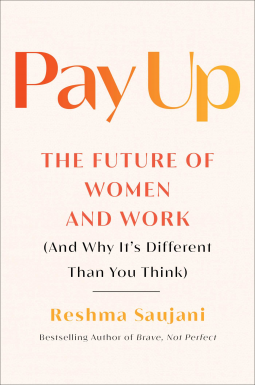For years, women have been juggling the needs of our fam ily members and our jobs, trying to live the life we had been taught to expect. We bought hook, line, and sinker into the promise of “having it all.” We leaned in and aspired to the sexy, empowered #Girlboss status, but we were always strain ing, stressing, obsessing, worrying, trying like hell to make it all work. Book after book, article after article-some admit tedly written by yours truly-offered advice and insights on how to strike a healthy work-life balance. Delegate! Color-code your calendar to stay organized! Declare the weekends an emailjree zone! Exercise! All of which sounded lovely in theory but laugh able to our overtaxed brains and cracking psyches. We had no idea it was about to get much, much worse.
Then the 2020 pandemic hit. Within a matter of weeks of COVID-19 reaching America’s shores, working women with children or relatives requiring care began to crack. As childcare facilities shut their doors and private babysitters and healthcare aides retreated to the safety of their own home bubbles, the security net made up of friends, neighbors, grandparents, and other caregivers we relied on for dear life vanished, leaving us on our own to man age the relentless and competing needs demanding attention. A Harvard/London Business School study substantiated how the pandemic considerably and inequitably ate into women’s time. Harvard assistant professor Ashley Whillans noted this would translate into twelve additional days of chores in 2021. No one magically invented extra hours, so these chores subsumed the leisure activities like exercise and connecting with friends that directly correlate with happiness and mental health. Remember “me time”? Yeah, neither do we.
Then came the clincher. Schools closed and we suddenly had yet another full-time de facto job: teacher. Nobody asked us. Nobody stepped up to help us. Nobody told our bosses they were required to offer us flextime to make it possible for moms to survive, and certainly nobody “forgave” the fact that we could no longer keep our motherhood discreetly tucked away. There it was, unfiltered and out in the open to anyone with a Zoom login link to see.
The resulting chaos created stunning fallout. One study reported a twenty-five percent jump in anxiety disorders; an other showed that in the first year of COVID-19, women’s alcohol consumption rose an astronomical forty-one percent. Burnout rates spiked alarmingly as women in the workplace who were mothers or who stepped into the role of caregiver to family members who fell ill held on to their jobs and their sanity by their fingernails. The pandemic had finally exposed the silent expectations placed on American working women, revealing them as painfully contradictory and completely impossible to meet.
The scale of the carnage across the economy for working moms was like nothing our generation had ever seen. Within months of the initial lockdown, huge swaths of the retail, child care, education, service, and hospitality sectors-industries dominated by women-were wiped out. According to Bureau of Labor Statistics, eighty percent of the workers who left the labor force in September 2020 were women-four times the number of men-including 324,000 Latinas and 58,000 Black women. More than one million single mothers-many of whom were already living below the poverty line-lost their jobs be tween February and April 2020. By February 2021, 2.5 million women had left the workforce-a data point Vice President Kamala Harris proclaimed constituted a “national emergency.” Women with stable jobs who could not sustain them along with the staggering new overlay of home responsibilities were voluntarily (so to speak) exiting the workforce in droves. Texas A&M professor of business administration and psychologist Anthony Klotz coined the phrase “The Great Resignation” back in May 2021, identifying the growing trend of departures overtaking the labor force. For many Americans, the pandemic had opened their eyes to a growing dissatisfaction with their jobs or career paths, and they left in pursuit of a more fulfilling life. For many others however-most notably women and even more so women of color-the exit was necessitated by a dearth of available or affordable childcare that would en able them to work. As Time magazine noted in October 2020, “Many women are leaving the workforce not because their jobs
have vanished but because their support systems have.”
A year in, so many women had left the workplace that women’s labor force participation, which had grown steadily since the 1970s, plummeted to levels not seen since the 1980s. As of September 2021, more than two million women over the age of twenty still remained out of the workforce in order to take care of their children and families-almost twice that of men of the same age.
This is all particularly sobering considering that in December 2019, just before the pandemic hit, women held more payroll jobs than men for the first time in nearly a decade. We had been the most empowered and best-educated women in the history of the world, yet suddenly we were thrown into a soul-crushing time machine that was dragging us back forty years. Silently and without debate-almost without comment-the employment gains of the feminist movement had been wiped out.
Every conversation I had with women in every sector from tech to academia revealed the frightening depths of frustration, confusion, anger, guilt, and despair we were all feeling. Women who couldn’t leave the workforce were cutting back their hours; those who couldn’t cut back their hours were los ing their minds.
How in the world did we get here? Or were we always here but pretending we weren’t? In our historic march toward equality, how could we not have seen that the doors the feminist movement cracked open in the workplace were not opened nearly wide enough to let in and keep the eighty-six percent of
American women who were or would become mothers in their lifetimes? How had educated, empowered women like me who are active in politics, with advanced degrees and boundless ambition, been conned into hiding half of ourselves?
…..
It took COVID-19 to rip the bandage off the ugly, festering, long-ignored wound that so many women share: that our work and dreams are not only taken for granted but viewed as expendable. As the default caregivers, we have become the un acknowledged, unpaid safety net in our country that invisibly holds everything together, and the pressure that places on us has become intolerable. This book is a call to action to make the systemic changes in our societal power dynamics when it comes to everything from pay to gender roles to how we define and value women’s domestic contributions in our culture.
This is a once-in-a-generation opportunity that must not be missed to redefine the future of women and work. A future in which the work of labor in the home is valued and compensated on par with the labor in paid jobs, in which quality, affordable childcare, and paid parental leave are understood as essential to preserving the innovation and diverse capital women bring to the workforce; one in which workers’ wellness is valued just as much as their output and women no longer have to hide half their identities in order to succeed.
As Amanda Gorman so eloquently reminded us, silence doesn’t mean peace. Women have silently suffered in this un sustainable reality for far too long, and we are not willing to re main complicit in the demise of our ambitions and sanity one more day. We cannot- no, we will not-support a workforce and economy that refuses to support us in return. Let’s get loud and finish this fight once and for all.

Excerpted from Pay Up published by One Signal Publishers, a division of Simon & Schuster, Inc. Copyright © 2022 by Reshma Saujani.


